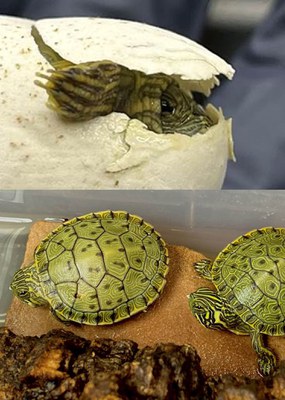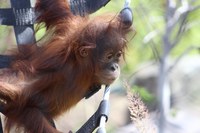ABQ BioPark 2023 Year in Review
From the grand opening of Asia at the Zoo to Rio Grande cooters, 2023 has been an exciting one here at the ABQ BioPark! Join us in reflecting upon our biggest stories from the past year.
Hello
Throughout the year, we’ve welcomed several new residents from A to Z! You can already see most of them in their public habitats, and the birds will be on exhibit after a routine quarantine period. Some of our new friends this year include:
- African Hornbills
- Bali myna
- Cuttlefish
- Malayan tiger
- Ocelot
- Red-legged seriema
- Von der Decken’s hornbills
- Western gray kangaroos
- Zebras
A year of rescue, conservation and animal welfare accomplishments
January started out with the surprise discovery of a young tiger cub being held as an illegal pet. The New Mexico Department of Game and Fish brought the cub to the ABQ BioPark Zoo, where our veterinary and animal care staff made sure he received proper diet and healthcare while we searched for a permanent home for “little” Duke. In March, our Aquatic Conservation Facility released 13,750 tagged Rio Grande silvery minnows. Our conservation work with the silvery minnows has been ongoing for 23 years, and we have released over 900,000 silvery minnows to date.
In August, we were extremely proud to share that the ABQ BioPark earned the American Humane Certified™ seal of approval for exceptional animal welfare, noting that our “commitment to animal conservation both locally and globally is commendable” and that “visitors will know that the Park has met American Humane’s high standards for care and the animals receive the love and compassion they deserve.” The certification process involves independent, third-party reviews to verify the many dimensions of animal welfare. Areas of evaluation include—but are not limited to—excellent health and housing, social interactions with other animals and handlers, safe and stimulating environments, and evidence of thorough preparation and protocols established to handle medical care. We couldn’t be more proud of this recognition!
October 5th saw the culmination of years of planning and over three years of construction on the highly anticipated Asia Expansion with a Grand Opening celebration! This 4.5 acre expansion provided new, complex habitats for our Malayan tiger, orangutans, siamangs, snow leopard, and Steller’s sea eagles. These new spaces also include maternity dens for Malyan tigers and snow leopards. We introduced our first ever Flex Habitats: connected spaces that allow the tiger, orangutans and siamangs to be rotated through four of the habitats (at different times, of course), which allows them to explore more total living space and experience the smells of other species, just as they would walking through their native range! Asia also gives guests a 360º view of these amazing species, and sets the new standard for animal wellbeing at the ABQ BioPark.
In November, we announced the construction of the ABQ BioPark Veterinary Diagnostic Lab. This on-site DNA testing lab will be only the eighth in the country of its kind, and will provide quick testing and shortened response time to the often-fatal endotheliotropic herpesvirus, or EEHV. This common, but deadly, virus affects both African and Asian elephants. Advances in technology and a growing body of knowledge continue to aid in the quest for a vaccine. The ultimate goal for scientists is to develop a cure for this terrible virus that impacts elephants worldwide, both in the wild and in human care.
We also completed a new, private pool for our hippo family, just in time for Moe’s 50th birthday! And speaking of birthdays…we celebrated TONS of happy days throughout the year and were especially excited about a trio of firsts: Bulan the Sumatran orangutan, Mashika the Western lowland gorilla, and Ike the gentoo penguin (who is also our first penguin chick ever) all celebrated their first year of life with their families and special species-appropriate treats and enrichment.

Reptile Roundup
Our Herpetology department had their own big news, too! In July, three juvenile Rio Grande cooters, hatched and raised at the ABQ BioPark, were released into the waters of the Black River in southeastern New Mexico. Since the time of that announcement, we are happy to share that we have hatched three more! Thanks to new state-of-the-art incubators and the attention of our reptile care team, the hatchlings (pictured) are thriving and providing invaluable data and knowledge on incubation and husbandry for this Near Threatened species.
Like all animals in our care, reptiles may come and go to other AZA facilities based on recommendations by their Species Survival Plan (SSP). 50 year-old West African slender-snouted crocodile Adjoa (pronounced A - joe - a) called the ABQ BioPark home since 2015. Over the past eight years she became a favorite of both guests and our reptile care team alike, known for her spunky personality and eagerness to train. West-African slender-snouted crocodiles are native to freshwater habitats of central and western Africa, and listed as critically endangered. Because her genetics are so valuable for conservation and maintaining a healthy and diverse population among AZA zoos, she received a recommendation to move to the San Diego Zoo in October to join their male for breeding. Although her team misses her, we are happy that she has this opportunity to help sustain her species!
Two of our Grand Cayman blue iguanas, Lola and Frank, also departed on breeding recommendations, while a new female arrived. After a routine quarantine period, she will be a companion for our male, Igor.
Goodbyes
We said a few goodbyes this year. It is bittersweet, but we know our animal residents received the best care possible while they were with us, and that those who moved away will continue to receive great care in their new homes.
- African lion siblings Kenya and Dixie moved to the Abilene Zoo.
- Koluk the polar bear passed away at 26 years old.
- We also said goodbye to one of our black-and-white ruffed lemurs, Kirby, at 33 years old.
- Sam the laughing gull passed away at 27 years old, he was believed to be one of the oldest of his species.
- Our resident Malayan tiger, Bunga (pronounced Boon-ya), was transferred to Hattiesburg Zoo in Mississippi.
- Kailash, a four year old male snow leopard born here at the BioPark to Sarani, was transferred to another AZA-accredited facility on a breeding recommendation.
- Our eight year old female Hartmann’s mountain zebra, Erste, also left for another facility, as well as Bowie the Cape vulture, 12.
The ABQ BioPark’s mission is fostering meaningful connections between people and nature. We look forward to continuing this mission with you all, and wish our community the happiest New Year. There are more exciting projects to come, Heritage Farm renovations and Australia Phase One are well underway. Cheers to more in ‘24!

